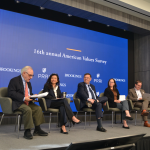In June, PRRI hosted a timely and urgent panel discussion to examine the state of LGBTQ rights.
PRRI affiliated scholars Andrews Flores, Ph.D., and Kelsey Burke, Ph.D., joined LGBTQ+ reporter for The 19th, Orion Rummler, and PRRI CEO Melissa Deckman, Ph.D. Together, they discussed recent PRRI research on Americans’ attitudes on LGBTQ issues and how to make sense of this data amid the rising wave of anti-LGBTQ measures across state legislatures, the Trump administration, and recent Supreme Court rulings.
Rummler noted that in the last five years, there has been an explosion in state-level anti-LGBTQ laws, largely focused on transgender youth. He noted that these laws have evolved to become broader and more extreme in what they want to achieve.
Along with this, Rummler acknowledged that the Trump administration’s efforts to enact executive orders that target LGBTQ people have had rippling effects.
“In the last 6 months, we’ve seen federal agencies enforce the vague idea that the administration has put forth [in the executive orders]. That’s what we see with cuts to NIH grants on research into transgender health. That’s where we see efforts to erase LGBTQ history, like Stonewall being changed on the National Park Service website.”
According to the PRRI American Values Atlas, Americans’ support for same-sex marriage has grown over the last decade, from 54% of Americans supporting same-sex marriage in 2014 to 67% in 2024.
Flores noted that the growth in support for same-sex marriage over the last two decades is unprecedented, as public opinion on very few issues has shifted this significantly. However, Flores did acknowledge the increasing prominence of anti-transgender rhetoric and policies.
For instance, opposition to laws that prevent parents from allowing their child to receive medical treatment for a gender transition decreased from 53% of Americans in 2022 to 49% in 2024.
“There is this kind of transference of this anti-transgender movement and how that is spreading to other LGBTQ issues. Across the board, we’ve seen that attitudes have become more sour around LGBTQ issues.” Flores added.
Deckman noted how souring attitudes towards LGBTQ rights are also influenced by broader ideas of gender.
According to the 2024 PRRI American Values Atlas, 43% of Americans agree that society as a whole has become too soft and feminine.
Additionally, Deckman noted the decline in support for marriage equality among young people.
“Younger Republicans are becoming more conservative overall. I think there’s often this assumption that younger people will moderate the politics of the Republican Party when it comes to issues like marriage equality. But, the other thing is that younger Americans are completely distrustful of most institutions in America, and I’m wondering if they’re just not happy about marriage.”
Burke commented on the recent U.S. Supreme Court case, United States vs. Skrmetti, in which the Court upheld a Tennessee law that banned puberty blockers and hormone therapy for minors, explaining that while the Tennessee law suggested that these medical treatments were new, they’ve existed for well over 100 years.
“We can think about the 1950s and 1960s as being an era when Americans started paying attention to what was called ‘sex change’ operations at the time, with the emergence of celebrities like Christine Jorgensen. Back then, there was no widespread political mobilization in opposition.”
Additionally, Burke mentioned that while proponents of anti-transgender rights identify it as a grassroots movement, in actuality, national political organizations are putting their money and resources into these targeted campaigns.
“Proponents of laws that oppose rights for transgender people talk about this as a grassroots movement, in that they’re responding to the concerns of parents or other concerned citizens. But this is really a targeted campaign that’s coming from the top down. The Trump administration, on Inauguration Day, signed executive orders, and something like 40% of political ads that came out in the weeks leading up to the election targeted transgender people.”
Finally, Flores acknowledged the difference in public opinion between laws that regulate transgender bodies and laws that limit transgender civil rights.
“When it comes to topics that involve transgender bodies, like medical care, sports, or locker rooms, people think about those issues differently than when they think about transgender civil rights. There is this great divide, and it is in civil rights discrimination that people are more supportive of transgender rights.”
View the full event recording here. Slides presented during the webinar are available here.
Read more about the U.S. vs. Skrmetti decision and the path forward for fighting gender-affirming care bans in Rummler’s recent article for The 19th News.
Find all PRRI research and commentary on LGBTQ issues here.








